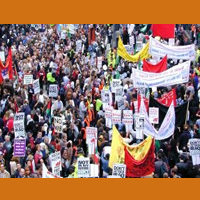MEER INFORMATIE OVER MONETAIRE HERVORMING
Meer Informatie Over Monetaire Hervorming
Documentatie en websites over ons monetaire systeem en (de noodzaak tot) monetaire hervorming vindt u hier. (LINK TO DOWNLOAD: LITERATUUR OVER MONETAIRE HERVORMING)
Citizen’s Initiative on Monetary Reform – The Netherlands
In 2015 the Dutch monetary reform movement Ons Geld managed to get over 100,000 signatures for a “Citizen’s Initiative” on monetary reform. A Citizen’s Initiative is a tool for putting a debate on the agenda of the main legislative body of The Netherlands, the Second Chamber of Parliament. To achieve this requires collecting a minimum of 40,000 signatures. The debate, held in April 2016, resulted in the decision to have the Scientific Council for Government Policy (Dutch acronym WRR) make a detailed analysis of the present monetary system and possible alternatives. By mid-2017 this study was still ongoing.
Videos
The below links give access to videos on our monetary system and (the need for) monetary reform
Why is there so much debt?
An excellent 3-minute video on Youtube from Positive Money, on the unsustainable indebtedness inherent to the current monetary system and the need for a new system based on public money creation. Should be required viewing for all politicians and economists – and is a must for all those who feel concerned by the fate of society and humanity. The Youtube page with this video also has, in the column on the right, suggestions for a range of other interesting videos.
A twelve year old Canadian girl explains in less than seven minutes how the Canadian citizenry is being exploited by the existing monetary system and how things can be done differently: by having parliament choose for public money creation. http://www.publicbankinginstitute.org/victoria_grant
More videos on http://positivemoney.org/videos/ and http://publicbankinginstitute.org/videos. On the Positive Money page among others a link to the independent documentary 97% Owned. This documentary of 130 minutes shows, through interviews with economists, politicians, former bankers and activists, how the debt-based privatized monetary system leads to one crisis after another and pushes up housing prices.



